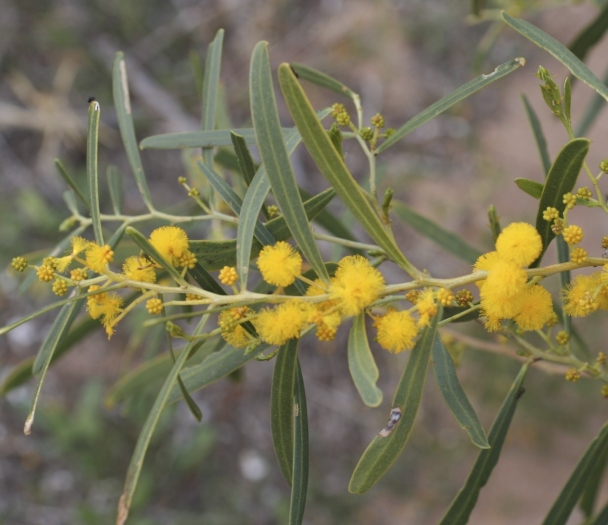Sandhill Wattle
(Acacia ligulata)
Sandhill Wattle (Acacia ligulata)
/
/

Ian McMaster
CC BY 4.0
Image By:
Ian McMaster
Recorded By:
Copyright:
CC BY 4.0
Copyright Notice:
Photo by: Ian McMaster | License Type: CC BY 4.0 | License URL: http://creativecommons.org/licenses/by/4.0/ | Occurence ID: https://www.gbif.org/occurrence/1632964324 | Publisher: Atlas of Living Australia |


























Estimated Native Range
Summary
Acacia ligulata, commonly known as Sandhill Wattle, is an evergreen shrub native to arid and semi-arid regions including plains, sandhills, and open woodlands across Australia. It typically grows as an erect or spreading shrub, reaching 2 to 4 meters in height and up to 3 meters across, sometimes adopting a dome-shaped form and often branching from the base. The Sandhill Wattle is well-adapted to its native habitat, thriving in harsh environments with poor, sandy soils and low rainfall.
This species is recognized for its vibrant yellow to orange globular flower heads, each 5-6mm in diameter, appearing singularly or in groups of 2 to 5 on short axillary racemes. The flowers bloom in winter and spring, providing a striking contrast against the foliage. The seed pods, or legumes, are light brown, curved, and segmented, breaking easily into one-seeded portions. Acacia ligulata is valued for its low water requirements, fast-draining soil preference, and resilience to full sun or part shade conditions. It is commonly used as a hedge or windbreak, for stabilizing sandy soils, revegetation, and erosion control, and can tolerate saline or alkaline environments. Additionally, it can be propagated from cuttings and has been utilized as emergency stock fodder in drought conditions. Gardeners should be aware that, while it is a hardy plant, it may be susceptible to root rot in poorly drained soils and can become weedy if not managed properly.CC BY-SA 4.0
This species is recognized for its vibrant yellow to orange globular flower heads, each 5-6mm in diameter, appearing singularly or in groups of 2 to 5 on short axillary racemes. The flowers bloom in winter and spring, providing a striking contrast against the foliage. The seed pods, or legumes, are light brown, curved, and segmented, breaking easily into one-seeded portions. Acacia ligulata is valued for its low water requirements, fast-draining soil preference, and resilience to full sun or part shade conditions. It is commonly used as a hedge or windbreak, for stabilizing sandy soils, revegetation, and erosion control, and can tolerate saline or alkaline environments. Additionally, it can be propagated from cuttings and has been utilized as emergency stock fodder in drought conditions. Gardeners should be aware that, while it is a hardy plant, it may be susceptible to root rot in poorly drained soils and can become weedy if not managed properly.CC BY-SA 4.0
Plant Description
- Plant Type: Shrub
- Height: 10-12 feet
- Width: 10-15 feet
- Growth Rate: Rapid
- Flower Color: Yellow
- Flowering Season: Spring
- Leaf Retention: Evergreen
Growth Requirements
- Sun: Full Sun, Part Shade
- Water: Low
- Drainage: Fast
Common Uses
Bee Garden, Bird Garden, Drought Tolerant, Hedges, Hummingbird Garden, Low Maintenance, Street Planting
Natural Habitat
native to arid and semi-arid regions including plains, sandhills, and open woodlands across Australia
Other Names
Common Names: Umbrella Bush, Marpoo, Dune Wattle, Small Coobah, Watarka, Wirra, Acacia
Scientific Names: , Acacia ligulata, Acacia pallidiramosa, Racosperma ligulatum,
GBIF Accepted Name: Acacia ligulata A.Cunn. ex Benth.